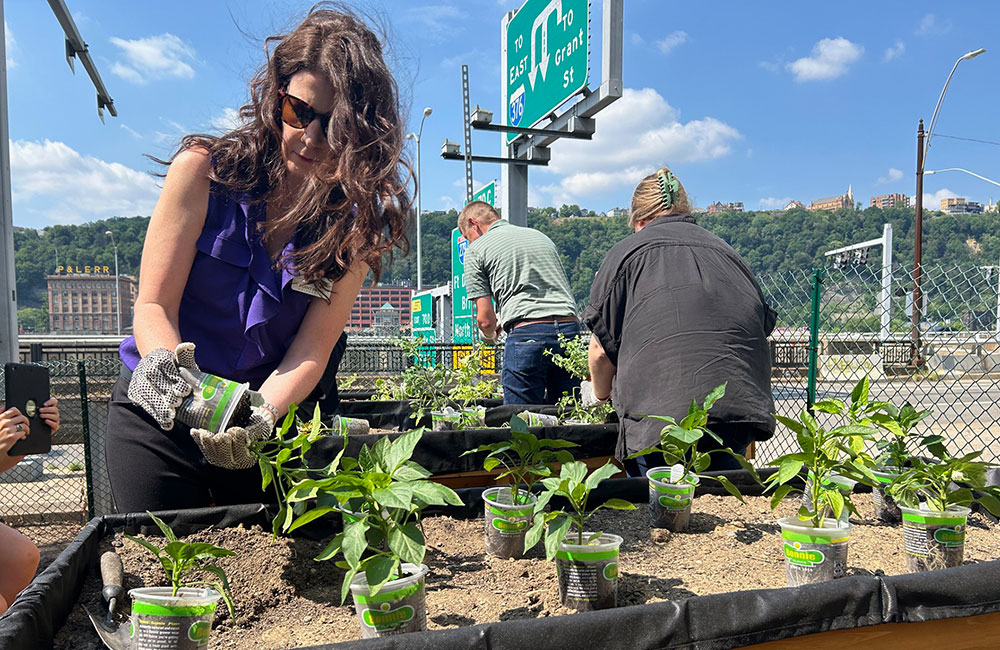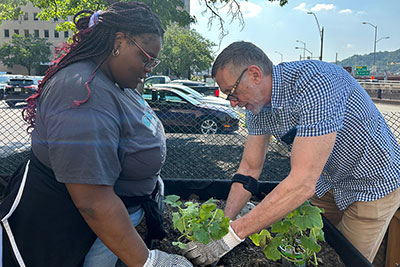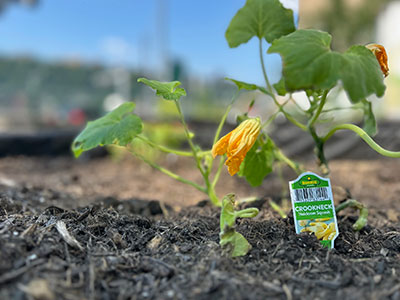Community Garden Will Combat Food Insecurity and Provide Free Produce to Students Thursday, July 18, 2024

A university located in the heart of downtown might not be the place you’d expect to find a garden. But tucked into the corner of the parking lot behind West Penn Hall are raised boxed gardens that are now growing plants such as tomatoes, banana peppers, herbs, squash, pumpkin and even watermelon. This fall, they'll help feed Point Park students.
Students will have access to the fresh produce through the Pioneer Pantry and new free corner store that will open this fall.
The garden is the culmination of years of dreams of Heather Starr Fiedler, Ph.D., chair of the Community Engagement & Leadership Department.
“Personally, I’m a terrible gardener, but I appreciate gardens and the sense of community they bring and the food they provide,” Fiedler said. “Obviously food insecurity is a big passion of mine, as well as access to healthy food.”
Fiedler partnered with the Western Pennsylvania Conservancy to build the garden. The Conservancy cleared the planting area of invasive trees and plants, supplied the raised garden beds and filled them, and purchased the plants. Kelly Flynn, education and special projects coordinator for the Conservancy, oversaw the project.
“It makes me happy that college students will have this opportunity because I know from my own personal experience I wasn’t cooking a lot for myself at that age,” Flynn said. “So you’re getting an understanding of where your food comes from, how hard it is to grow it and not wanting to waste it.”
Staff members, coordinated by the Staff Community Engagement committee, planted the vegetables in the prepared soil. Camryn Drabenstadt, alumna and photography lab manager, was excited to take part.
“I love plants and am a big gardener,” Drabenstadt said. “All the food goes to the Pioneer Pantry and that program is awesome. I’m happy to hear they have stuff like this going. I think it’s really good for the community.”

Throughout the summer, staff volunteers will care for the garden, but once students are fully back on campus, Fiedler plans to reinvigorate a student garden club. Members of the club will work together to make decisions and solve problems concerning the garden, an objective Flynn agrees will benefit the students.
“This will be a community where they have to work together to solve problems like pests or under-watering or over-watering,” Flynn said. “These are skills that are essential especially for this time in their life.”
Beyond nourishment and life skills, Fiedler sees the garden providing mental health benefits as well. Working in the dirt and even visiting greenspace is beneficial to mental health. “I want to paint the outside of the railroad ties with a mural,” Fiedler said. “I'd like to get a chair and put lights on the tree so people can just come and sit here and talk. We want it to be a space for students to come — and faculty and staff, too.”
 Given its location next to Fort Pitt Boulevard, questions are inevitably raised concerning those outside of the campus community accessing the garden. Fiedler isn’t concerned.
Given its location next to Fort Pitt Boulevard, questions are inevitably raised concerning those outside of the campus community accessing the garden. Fiedler isn’t concerned.
“If someone who is homeless needs a tomato, that’s what we’re doing it for — for our community, and our community includes those who live around us,” Fiedler said. “If you need a vegetable, let’s work together.”
In addition to the garden, Fiedler is developing a free corner store that will be available for students to come shop for their pantry items rather than only receiving free food through a Pioneer Pantry pick-up.
The store, which is located on the first floor of Thayer Hall not far from Student Accounts, will be open this fall. This summer, students in the 412 Impact Service Learning Camp helped assemble the shelves that will hold dry goods.
Both the garden and corner store are funded by a grant from the state. In February, Point Park received $34,100 from the 2023-2024 PA Hunger-Free Campus Grant to expand the services it already offers to students to fight food insecurity on campus.
Point Park was previously recognized by the state with a Pennsylvania Hunger-Free Campus + designation, which identifies the school “as a leader in this work, one that has gone above and beyond to alleviate hunger among college students.” Earning that recognition made it eligible to apply for the state grant program.
Point Park Community Garden Featured on Talk Pittsburgh
More About: community engagement, Downtown Pittsburgh

